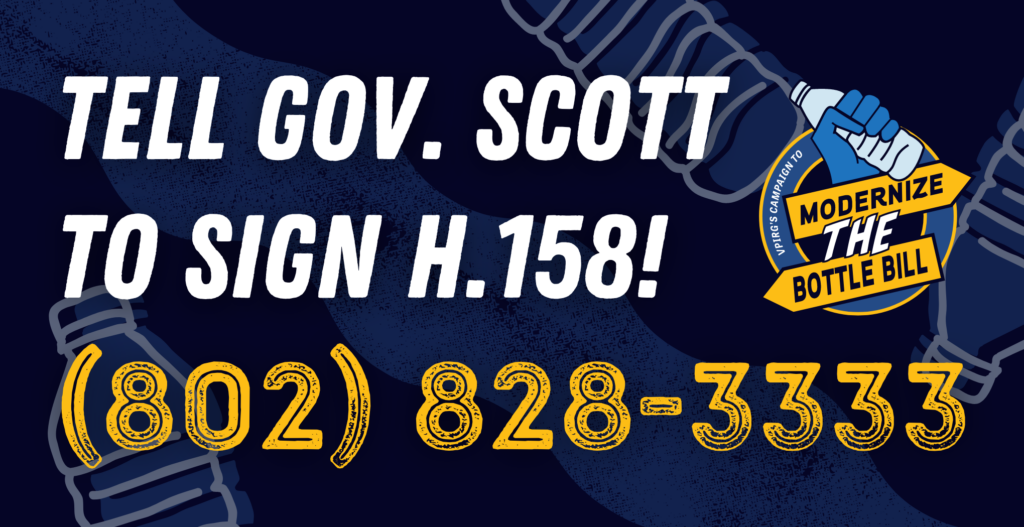The Vermont Legislature gave final approval to legislation that would update and substantially expand the scope of the state’s popular beverage redemption program, commonly known as the Bottle Bill. The House of Representatives concurred on Tuesday with a version of the bill passed by the Senate last month. The House action came during a special one-day veto override session.
The Vermont Public Interest Research Group (VPIRG) has been one of the leading proponents of modernizing the Bottle Bill for many years. Marcie Gallagher, VPIRG’s Environmental Advocate, applauded the legislative action. “This is a great win for consumers and the environment,” she said. “An updated Bottle Bill will mean better recycling, less pollution, and more convenient redemption locations all around the state.”
The bill is intended to modernize a law that has been on the books for more than 50 years. Key attributes of the bill are that it would:
- Require a minimum of three redemption centers per county, along with a redemption center in any densely populated downtown and in any municipality of 7,000 or more people.
- Promote clean air, clean water, and a cooler climate by collecting many more containers each year to be recycled into new products again.
- Exempt small retailers from the redemption program while streamlining the process for redemption centers.
- Expand the scope of the program beginning in 2027 to cover more beverages such as water, sports drinks, hard cider, and wine.
“The Bottle Bill has been Vermont’s most successful recycling and anti-litter program for the past 50 years,” Gallagher added. “But many of the most popular beverages today didn’t exist in 1972 when the program was established. It’s time to update the law as nearly every other state with a bottle deposit program has done.”
Vermont’s Bottle Bill covers about 46 percent of beverages sold here. By contrast, Maine’s program has been updated so that it covers more than 90 percent of beverages.
It’s estimated that over ten billion containers have been recycled through Vermont’s Bottle Bill program since it was first implemented. The program has consistently maintained redemption rates of 75%or greater, even when national recycling rates have plummeted.
Bottle Bill supporters point out that virtually every container returned for redemption is recycled into another product – often a new beverage container. In contrast, materials collected through curbside recycling tend to be more contaminated and therefore much less valuable.
For example, the Chittenden Solid Waste District paid a penalty of $400,000 after being caught dumping glass that had been collected for recycling between 2013-2018. CSWD had dumped an estimated 18,000 tons of glass over that period because its material was too dirty to market.
“VPIRG has been fighting to update the Bottle Bill for decades,” said Paul Burns, executive director of VPIRG, who noted that both VPIRG and the Bottle Bill both came to be in 1972. “This legislation finally delivers for the environment, for consumers, and for small businesses in the state. It’s now up to Gov. Scott to sign this bill into law.”
Beverage redemption programs are increasingly popular worldwide, particularly as nations grapple with the mounting problem of plastic pollution. Approximately 600 million people now live in areas covered by Bottle Bills. That number has doubled in the last five years.
In Vermont, a poll completed in 2021 found 88 percent of the state’s residents in support of the Bottle Bill, and 83 percent favored expanding it to cover more beverages as the current legislation would do.
Despite the broad public support for the Bottle Bill legislation, Gov. Scott has expressed opposition to the proposal. The governor has strong ties to waste industry giant Casella Waste Systems, which has long opposed the Bottle Bill program. Casella earned scorn from legislators when it set up a phony environmental group last legislative session as a front to oppose an updated Bottle Bill.
The governor has five days to decide whether to sign or veto the legislation once it reaches his desk. He could also let the bill become law without his signature. The bill is expected to be delivered to the governor within days. Advocates, consumers, and many small business owners are urging the governor to sign the legislation.
# # #

